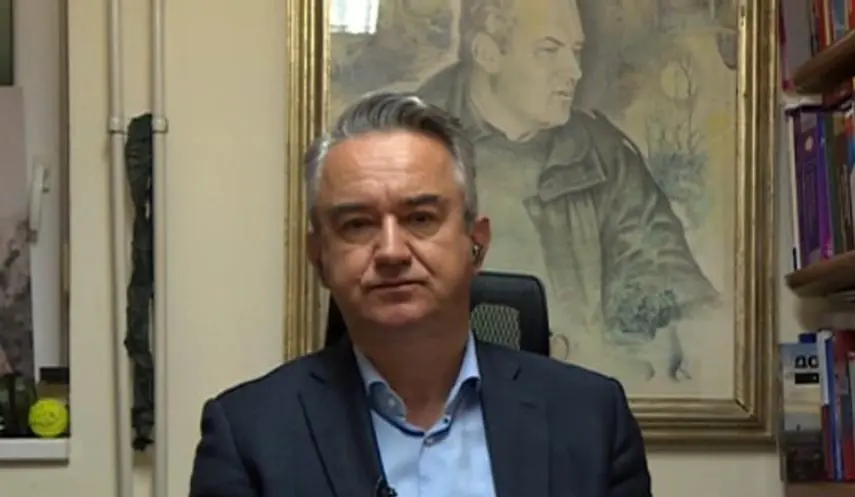DARKO MLADIĆ: NEW RULES BEING ESTABLISHED FOR GENERAL MLADIĆ
Serbia - The Hague - Mechanism
07/29/2025
21:14

BELGRADE, JULY 29 /SRNA/ - The decision of the International Residual Mechanism for Criminal Tribunals in The Hague to reject the request for early release of the ailing General Ratko Mladić shows that new rules have been introduced specifically for him and that the political circus in The Hague continues, General Mladić’s son, Darko Mladić, told SRNA.
Darko Mladić said that the decision contains new, previously unenforced rules, and described the way it was announced as scandalous — first published on the Mechanism’s website, and only later communicated to the lawyers and General Mladić himself, in violation of all previously observed procedures.
“It seems that new rules are being established specifically for General Mladić. We learned about the decision from the media. Neither my father nor his attorney received the decision initially. It was sent to his attorney only after it had already been published on the Mechanism’s website, which had never been the court’s practice before,” said Darko Mladić.
Regarding the decision itself, he pointed out that the president of the Mechanism, Judge Graciela Gatti Santana, is “clearly establishing a new rule for General Mladić,” since, in several other cases, terminally ill convicts were granted early release.
Moreover, he emphasized that all doctors agree that General Mladić is suffering from multiple terminal illnesses, not just one.
Darko Mladić noted that Santana "introduced a new term — acute terminal illness," which had not existed before and is now being used for the first time as a standard.
"In other cases where individuals with terminal illnesses were released, the term 'acute terminal illness' did not exist. It was sufficient for a person to have a terminal illness — and in the General's case, he is suffering from multiple such illnesses," Darko Mladić said.
He emphasized that Judge Prisca Matimba Nyambe supported General Mladić's release, stating that there is no longer any justification for keeping him in prison and that doing so constitutes inhumane treatment.
"We would focus on Judge Nyambe's opinion, regardless of the fact that some judges are trying to shift the focus to the quality of care or his age. That is a manipulation of the facts, because the issue is not how old he is or how well he is being cared for — the issue is that he suffers from multiple terminal illnesses and, as such, has long met the criteria for release to Serbia," Darko Mladić explained.
He noted that Judge Orie's reaction was particularly noteworthy, adding that this time he was even harsher than the others.
"I would like to point out that he is in a conflict of interest, because as a Dutch national, he should not have been allowed to try General Mladić. He declared himself a 'citizen of the world' and claimed he was no longer Dutch, so I’m quite curious to know whether he currently holds a Dutch passport while making decisions about General Mladić’s release," said Darko Mladić.
He stressed that he will continue to fight for his father’s rights and that neither the family nor the General’s legal team will be deterred by this.
“As long as he is alive, we will continue to fight for the rights he is entitled to, and the court established by the UN Security Council must respect the rules set by the UN, rather than inventing its own rules based on political needs,” Darko Mladić said.
The International Residual Mechanism for Criminal Tribunals /IRMCT/ rejected the urgent request by General Ratko Mladić’s defense for temporary or conditional early release due to his poor health.
The President of the Mechanism, Judge Graciela Gatti Santana, stated in the decision that uncontested medical opinions “indicate that Mladić is approaching the end of his life, which is the human condition, and that his current health status, requiring reliance on others for daily activities, is serious.”
“Nevertheless, Mladić continues to receive very comprehensive and compassionate medical care, which is amply documented in medical reports. The information available to me shows that the compelling humanitarian grounds Mladić cited as the basis for his release are not substantiated,” Santana stated.

SERBS IN TEARS AND FEAR OVER OWNERSHIP OF ORTHODOX CEMETERIES AND CHURCHES

CVIJANOVIĆ DEMANDS ACCOUNTABILITY FOR SHAMEFUL CONCERT IN ŠIROKI BRIJEG

OSTOJIĆ URGES BiH AND EU TO ACT OVER GLORIFICATION OF FASCIST IDEOLOGIES





